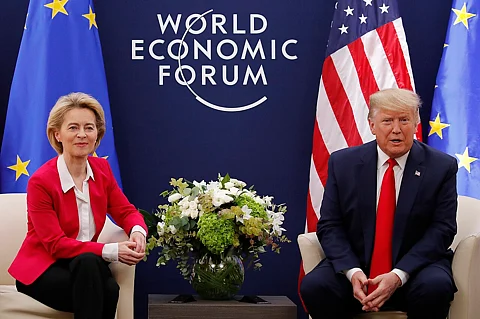

U.S. President Donald Trump announced on Sunday that he would postpone his threatened 50% tariffs on the European Union until July 9, following a phone call with European Commission President Ursula von der Leyen. The decision marks a temporary de-escalation after Trump warned on Friday that he would impose the steep tariffs as early as June 1, claiming trade talks with the EU were "going nowhere."
Speaking to reporters before boarding Air Force One in Morristown, New Jersey, Trump said von der Leyen had requested the extension, stating that the EU was prepared for "serious negotiation." The U.S. president agreed, delaying what could have been a major escalation in transatlantic trade tensions.
Von der Leyen confirmed the discussion on social media, calling it a "good call" and emphasizing that the EU is "ready to advance talks swiftly and decisively." She added that reaching an agreement would require additional time, hence the July 9 deadline.
Brussels and Washington have been engaged in negotiations to avoid a full-blown trade war since Trump announced sweeping tariffs in April. While both sides had initially agreed to suspend tariff actions until July, Trump’s abrupt threat on Friday raised concerns of a breakdown in talks. At the time, he dismissed the prospect of a deal, reiterating his long-standing criticism that the EU was designed to "take advantage" of the U.S.
The EU has already drawn up retaliatory measures, including nearly €100 billion in tariffs on U.S. goods, should negotiations fail. Maroš Šefčovič, the EU’s trade chief, stressed that any agreement must be based on "mutual respect, not threats."
Germany’s Finance Minister and Vice Chancellor, Lars Klingbeil, echoed calls for diplomacy on Sunday, urging "serious negotiations" over further provocations. He warned that Trump’s tariffs would harm the U.S. economy as much as Europe’s, following discussions with U.S. Treasury Secretary Scott Bessent.
Trump has imposed multiple rounds of tariffs on the EU since taking office, including 25% duties on steel, aluminum, and automobiles, as well as a 20% "reciprocal" levy—since suspended—on all imports. A baseline 10% tariff remains in effect.
The U.S. trade deficit in goods with the EU reached $236 billion in 2024, though the European Commission notes that including services—where American firms dominate—the deficit narrows to €50 billion.
With the new July 9 deadline, both sides now face heightened pressure to reach a compromise or risk further economic disruption.